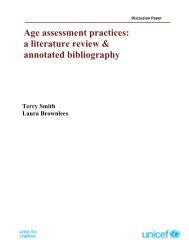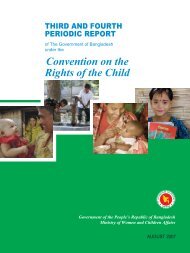Government-funded programmes and services for vulnerable - Unicef
Government-funded programmes and services for vulnerable - Unicef
Government-funded programmes and services for vulnerable - Unicef
You also want an ePaper? Increase the reach of your titles
YUMPU automatically turns print PDFs into web optimized ePapers that Google loves.
Department of Social Development<br />
who are in urgent need of care <strong>and</strong> protection out of the protection system, <strong>and</strong> children<br />
<strong>and</strong> caregivers in need of financial support away from the FCG. 39<br />
This has placed the foster care system in crisis. The growth in the number of orphans in<br />
South Africa over the past few years, a trend which is likely to continue, is indicative of the<br />
growing scale of dem<strong>and</strong> that we are likely to see. In 2008, there were approximately 3.95<br />
million orphans in South Africa, a million more than in 2002 (Meintjies & Hall 2010: 102).<br />
There is an urgent need <strong>for</strong> the development of an alternative source of financial <strong>and</strong><br />
other necessary support <strong>for</strong> orphaned <strong>and</strong> ab<strong>and</strong>oned children living with their relatives,<br />
other than the <strong>for</strong>mal foster/child protection system that is currently available. There is a<br />
need <strong>for</strong> a system that does not rely so extensively <strong>and</strong> indiscriminately on onerous use of<br />
social workers <strong>and</strong> the children’s courts.<br />
The DoSD has recognised this need <strong>and</strong> has initiated early steps towards developing a<br />
social assistance programme <strong>for</strong> caregivers, with the objective of caregivers’ benefits by<br />
2010/11 (DoSD 2009d).<br />
Reach of the CDG <strong>and</strong> the disability grant<br />
The reach of the CDG <strong>and</strong> the disability grant is limited – it excludes support <strong>for</strong> children<br />
with moderate disabilities <strong>and</strong> with chronic illnesses.<br />
Eligibility criteria <strong>for</strong> the CDG (<strong>and</strong> the disability grant) are narrow, resulting in the exclusion<br />
of many <strong>vulnerable</strong> children <strong>and</strong> adults with a disability or a chronic illness from benefiting<br />
from the grants. For example, the CDG has only been available <strong>for</strong> children with a disability<br />
so severe that they require permanent home care. This has meant the exclusion of children<br />
with moderate <strong>and</strong> mild disabilities such as hearing <strong>and</strong> visual impairments. There is a further<br />
requirement, in addition to the need <strong>for</strong> 24-hour care, that the condition must be permanent.<br />
There<strong>for</strong>e a child who is HIV positive <strong>and</strong> not in the terminal stages of the disease will not<br />
qualify <strong>for</strong> the CDG, regardless of the fact that their additional nutritional <strong>and</strong> healthcare<br />
needs require additional resources. The researcher was advised by SASSA’s General Manager<br />
of Operations in the Grant Administration Branch, Dianne Dunkerley, that changes are being<br />
considered so as to provide a CDG <strong>for</strong> temporary conditions.<br />
In the case of the disability grant <strong>for</strong> adults, the impact that the illness or disability has on<br />
the person is the criterion <strong>for</strong> determining eligibility. If the condition affects the applicant’s<br />
ability to work, then a disability grant will be considered. This may be a permanent or<br />
a temporary grant. This means that an adult caregiver who has AIDS may qualify <strong>for</strong> the<br />
disability grant if it affects their ability to work. If, however, the caregiver’s health improves<br />
as a result of antiretroviral therapy (ART), then the disability grant will cease. 40<br />
The Social Assistance Amendment Bill of 2010 41 offers some relief by exp<strong>and</strong>ing the scope<br />
of the CDG <strong>and</strong> the disability grant to children <strong>and</strong> adults with not only severe but also<br />
moderate disabilities, which either require permanent care or <strong>services</strong>, or which impair<br />
their ability to obtain gainful employment or to obtain the means necessary to provide <strong>for</strong><br />
their own maintenance. 42<br />
39 National Welfare, Social Service <strong>and</strong> Development Forum, 2008<br />
40 Personal communication with Dianne Dunkerley, General Manager, Operations, Grants Administration Branch, SASSA<br />
41 <strong>Government</strong> Gazette No. 32986, 1 March 2010<br />
42 Article 12 <strong>and</strong> the definition section<br />
69
















